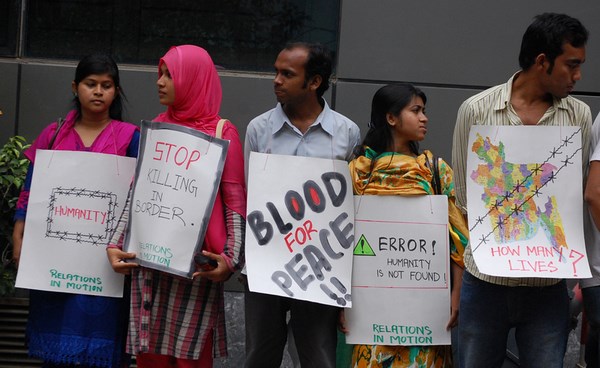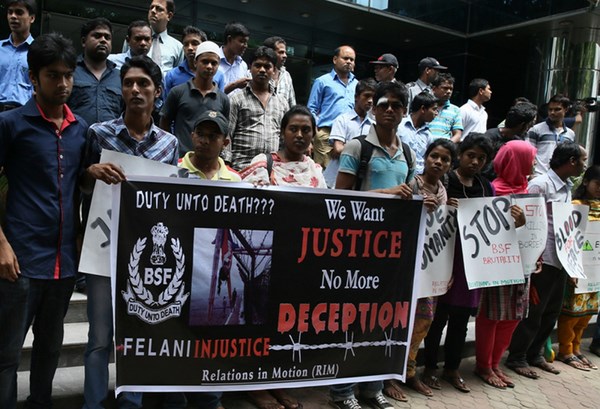A special court in India's state of West Bengal has found an Indian border guard not guilty in the shooting death of a 15-year-old Bangladeshi girl on the India-Bangladesh border, touching off a wave of anger in Bangladesh.
The court acquitted Border Security Force constable Amiya Ghosh of murder charges on September 6, 2013.
Ghosh was accused of shooting Bangladeshi Felani Khatun on January 7, 2011 as she tried to cross the barbed-wire fencing at the Anantapur border point in Kurigram’s Phulbarhi Upazila on her way back to Bangladesh with her father. Fatally wounded, Khatun was left hanging in the barbed wire, screaming, for four hours until she died. Nobody helped her.
Photographs of her dead body tangled in the wire were widely published at the time. Ghosh's acquittal on September 6 only aggravated the already strained relations between India and Bangladesh.
much uproar in Bangladesh, especially on social media. Asfaque Nipun called the special court a farce on Facebook:
Bangladesh is a large market for Indian products and media. Many angry netizens have called for boycott of Indian products. Blogger and writer Akter Ahmed told Bangladeshis on Facebook:
Originally written by Pantha Rahman Reza Translated by me. Published on Global Voices
Ghosh was accused of shooting Bangladeshi Felani Khatun on January 7, 2011 as she tried to cross the barbed-wire fencing at the Anantapur border point in Kurigram’s Phulbarhi Upazila on her way back to Bangladesh with her father. Fatally wounded, Khatun was left hanging in the barbed wire, screaming, for four hours until she died. Nobody helped her.
Photographs of her dead body tangled in the wire were widely published at the time. Ghosh's acquittal on September 6 only aggravated the already strained relations between India and Bangladesh.
much uproar in Bangladesh, especially on social media. Asfaque Nipun called the special court a farce on Facebook:
So the verdict came; "No One Killed Felani!" What a joke!Farjana Jannat (@farjana_neela) wrote on Twitter that this verdict was the death of justice:
No one killed or hanged the dead body of #Felani - all this happened automatically R.I.P #Justice pic.twitter.com/OhBvjF84xK — Farjana Jannat (@farjana_neela) September 6, 2013Twitter user Subal Sarkar ( @burningNlearnin) believed that the verdict will escalate extrajudicial killings on the border by the Border Security Force:
RT@bewahid: ফেলানীর রায় একটা বার্তা দেয় এমন নির্মম হত্যা আরো চলবে। — Subal Sarker (@burningNlearnin) September 6, 2013
RT@bewahid: The Felani killing verdict gives us the message that these kind of brutal assassinations will continue.Bangladesh has a 3,715 km long land border with India along its three sides. Each year, many face bullets from the Indian border guards, some unlucky for traveling close to the border. According to a BBC report [bn], 38 Bangladeshis were shot dead by the security force in 2012. Shantanu Banik explained on Facebook why these people face death:
Bangladesh is a small country next to the mighty India. Therefore, illegal immigration and border-crossing isn't uncommon. Everyday, ordinary people choose to take unthinkable risk in hopes of a better life on the other side of the fence. It is [a] crime, but a petty crime. Not one that deserves the 'Shoot on sight' policy enforced by the Indian Border Security Force (BSF). [...]
 |
| Students form a human chain in front of the Indian high commission protesting against the verdict in the Felani killing case in India. Image by Indrajit Ghosh. Copyright Demotix (9/9/2013) |
এই রায়ের বিরুদ্ধে আপনার ক্ষুদ্ধ প্রতিক্রিয়া এবং অনুভূতিকে সম্মান জানিয়ে বলছি- সম্ভব হলে টিভিটা একটু বন্ধ করেন, 'কৌন বনেগা ক্রোড়পতি'র অমিতাভ বচ্চনের দরাজ গলার সামনে আপনার কথাগুলো বেশ অস্পষ্ট এবং বেমানান লাগছে!
With respect to your outraged reactions and feelings I am requesting - please turn off the TV for a while. Amitabh Bachchan's [Indian actor and anchor of India's version of "Who Wants to be a Millionaire"] loud voice on TV is overshadowing your voice.But Facebook user Muquit Muhammad does not subscribe to that:
ফেলানী হত্যার রায়ের সাথে ভারতীয় টিভি অনুষ্ঠান পছন্দ করার সম্পর্ক কি? ঐদেশের টিভি অনুষ্ঠান পছন্দ করি বলে আমার দেশের মানুষকে তাদের মেরে ফেলা যেমন জাস্টিফাইড না, তেমনি এই কুবিচারের প্রতিবাদে ঐদেশের টিভি অনুষ্ঠান বর্জনও কোনো যৌক্তিক প্রতিবাদ না|
How is the Felani killing related to liking an Indian TV program? Just as it is not justified to kill us because we like their TV, it is not logical to boycott their TV programs because of a sham verdict.A Facebook event has been created to organize a sit-in protest in front of the Indian High Commission in Bangladesh. The High Commission requested everybody to wait till the final outcome. According to a spokesman “this is subject to review by a competent authority". But the special court does not allow the victims family to appeal.
Originally written by Pantha Rahman Reza Translated by me. Published on Global Voices

























0 comments:
Post a Comment